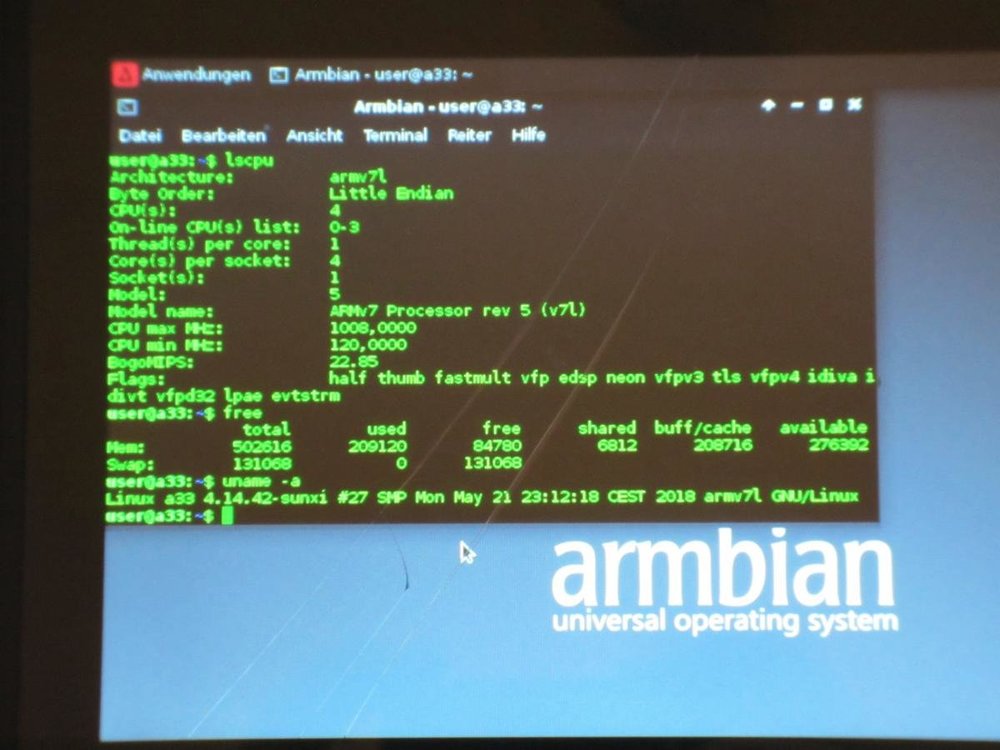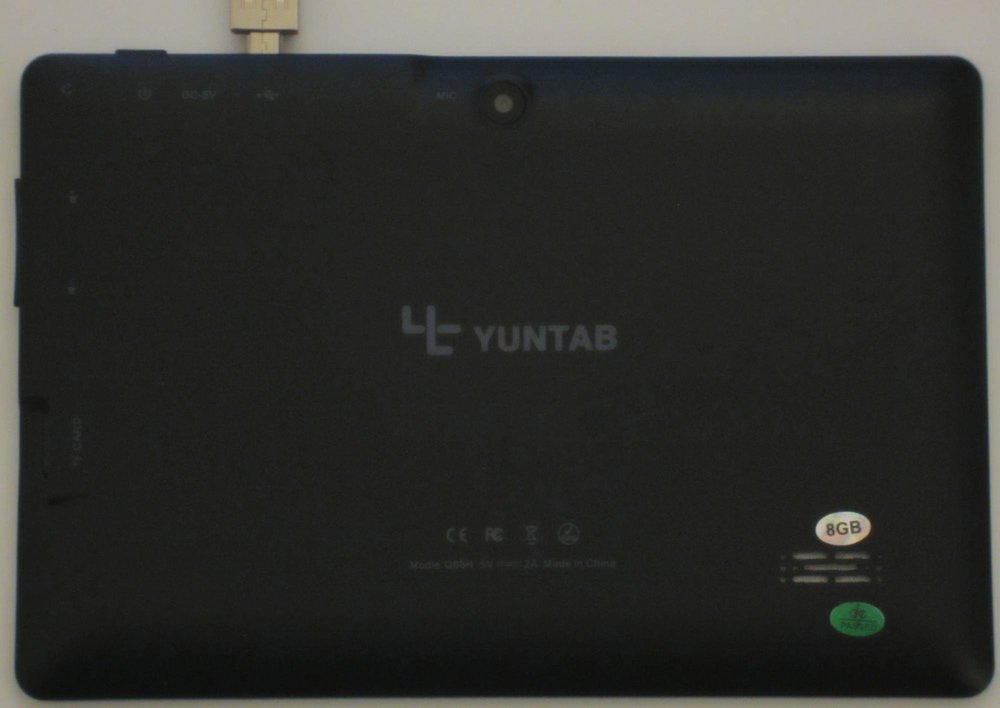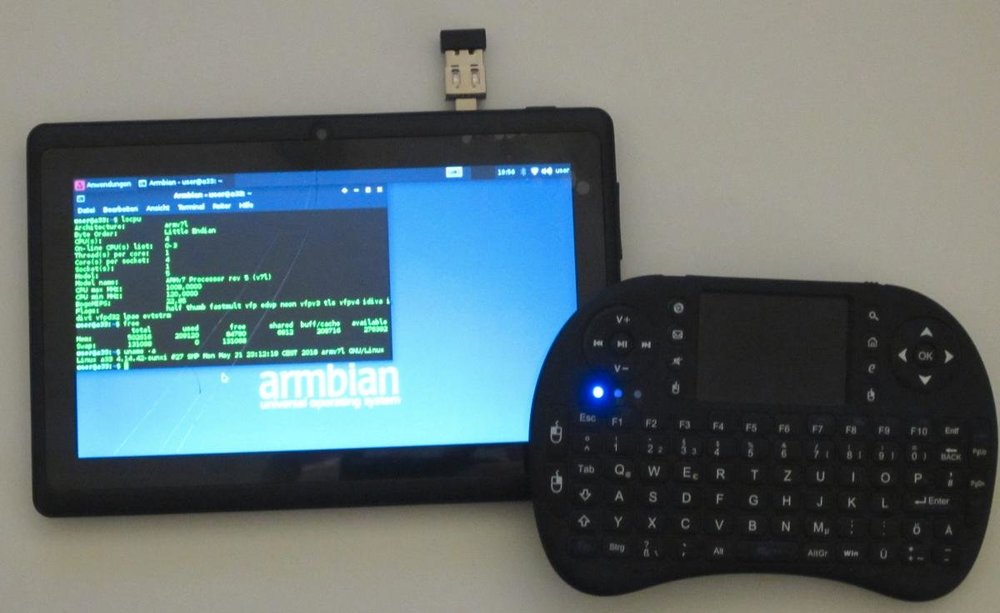
tpc010
-
Posts
26 -
Joined
-
Last visited
Content Type
Forums
Store
Crowdfunding
Applications
Events
Raffles
Community Map
Posts posted by tpc010
-
-
Important is the correct defconfig for the tablet, you have to test some of them.
The only thing I changed was the BOOTCONFIG line and add the g_serial to the modules for OTG USB (and wifi modules)
check if there is a newer or different version in u-boot
armbian/cache/sources/u-boot/v2018.XX/configs$ ls -1 *[Aa]33*
A33-OLinuXino_defconfig
q88_a33_tablet_1024x600_defconfig
q8_a33_tablet_1024x600_defconfig
q8_a33_tablet_800x480_defconfig
Sinlinx_SinA33_defconfig
-
On 12/5/2018 at 7:40 PM, markbirss said:
@tpc010 is it possible for you to share your last known working image ?
I found a YunTab 7, but my build stuck at starting kernel....
Hi, sorry for the late response, do you blacklisted the pwm module? Otherwise the screen will go black.
"echo blacklist pwm_bl>/etc/modprobe.d/pwm.conf"
Do you have some last messages before the kernel stuck?
At the moment I have no time to build a clean Image, sorry.
I hope next week.
br
-
10 hours ago, guidol said:
which one from ebay would work (without touch)?
Tablets like this, I bought it at ebay with broken Touch for testing, also a broken 10,1" Tablet, this was also working for testing, and an A88S from alldaymall.
Wifi is also working, but this can change from tablet to tablet.
Yuntab Q88H - 7 Zoll Tablet PC,Android 4.4, Quad Core, HD 1024x600, Dual-Kamera, Bluetooth, Wi-Fi, 8GB
-
On 9/15/2018 at 10:19 PM, markbirss said:
@tpc010 What specific tablet you are using ? Are you able to boot a Armbian build image directly from sdcard now?
Hi Markbirss, I checked it again with current build and it's working with module "g_serial" add to boards/lime-a33.conf
config/boards/a33-q8-tablet2.conf
# A33 quad core 1Gb SoC BOARD_NAME="q8 A33" BOARDFAMILY="sun8i" # depending of board and resolution use a defconfig file from sources/u-boot/v2018.05/configs BOOTCONFIG="q8_a33_tablet_1024x600_defconfig" #MODULES="hci_uart gpio_sunxi rfcomm hidp bonding spi_sun7i 8021q a20_tp" MODULES="hci_uart gpio_sunxi rfcomm hidp bonding spi_sun7i 8021q a20_tp g_serial gslx680 gc0312 gc2145 rtl8150" MODULES_NEXT="hci_uart gpio_sunxi rfcomm hidp bonding spi_sun7i 8021q a20_tp g_serial gslx680 gc0312 gc2145 rtl8150" OVERLAY_PREFIX="sun8i-a33" # KERNEL_TARGET="next" CLI_TARGET="stretch:next" DESKTOP_TARGET="" # RECOMMENDED="Debian_stretch_next:75"
~/armbian/cache/sources/u-boot/v2018.05/configs$ ls -1 *[Aa]33* A33-OLinuXino_defconfig q88_a33_tablet_1024x600_defconfig q8_a33_tablet_1024x600_defconfig q8_a33_tablet_800x480_defconfig Sinlinx_SinA33_defconfig
I had to disable the pwm_bl module, otherwise the screen will go black while boot.
echo blacklist pwm_bl>/etc/modprobe.d/pwm.conf
I checked it with some Allwinner A33 Tablets from eBay or Amazon, the touch isn't working at the moment, but I hope I have time to check it in the future.
-
UPDATE: Today I build it again and now it's working, I think someone has change something. Thank you :-)
OLD:
I created an new board, based on the lime-a33.conf with BOOTCONFIG="q8_a33_tablet_1024x600_defconfig" and build a Debian Stretch Image with mainline Kernel 4.13 / 4.14. The SD Card is booting with a nice screen output but only to Kernel Boot, then the screen freezes.
The Serial connection is only in the SD Adapter and I cant use it if I'm booting from it, or is there a possibility ??
I was checking devuan.org and this Image is booting the Tablet, with Kernel 4.1x.
So I want to debug the Armbian Kernel with serial output and I used fastboot for it, I'm booting into fastboot with "adb reboot bootloader" and then I'm sending the bootimage with fastboot ( first I created a image with mkimage with and without dtb file)
fastboot -c "console=ttyS0,115200" boot uImageBut I get this error from armbian Kernel
Starting kernel ... Uncompressing Linux... done, booting the kernel. Error: unrecognized/unsupported machine ID (r1 = 0x00001029). Available machine support: ID (hex) NAME ffffffff Generic DT based system ffffffff Allwinner sun9i Family ffffffff Allwinner sun8i Family ffffffff Allwinner sun7i (A20) Family ffffffff Allwinner sun6i (A31) Family ffffffff Allwinner sun4i/sun5i Families Please check your kernel config and/or bootloader.Full Log is attached.
I checked a lot of things, but I can't find a solution to solve this problem, the devuan.org Kernel is booting this way, until it can't find the SD Card.
Thanks for your Help
-
Hi, I also created a Image with the current armbian git builder and it's working, eth0 is working, wlan is not important at the moment.
Great work, thank you.
-
Hi tcp010....
I have Mini M8S, and i have a question about RTL8723BS Module driver for the Wifi in Mini M8S....
I have build the driver, but i cannot make the Wifi to work....
if can make the Wifi to work, please share the "how to" about it.
Thanks....
Hi sukamine,
I'm using Ethernet, so I don't need Wifi, sorry, but if I have time I will check it.
br tpc010
-
Hi tpc010, I had exactly the same problem, I 've done "apt-get distupgrade", only I don 't have OTG USB, only USB male/male, my box is Q-Box, amlogic 905, please would You be so kind to inform me in detail how I can resolve this? Regards, Jefken3.
Hello Jefken3,
you have to open the Box and search for the Nand or EMMC Flash, then figure out which pins you have to shorten to recover over USB OTG, the Mini M8S has also only full size USB, one of them has OTG.
See this for more informations http://freaktab.com/forum/tv-player-support/amlogic-based-tv-players/s905/tronsmart-ac/firmware-roms-tools-at/565449-running-linux-from-sd-card-or-usb-flash-drive-using-balbes150-method-and-files/page13
br Tpc01
-
We're not talking about how much memory is used (not related to running X) but how much is available to the system (look at the first column in the free command's output). The following line, which is missing from @balbes150 script, should free some more:
if test "${nographics}" = "1"; then fdt rm /reserved-memory; fdt rm /aocec; fiOK, booted Armbian on M8S Mini without a problem using the multiboot method. The 2 GB memory limit is still there (probably the same kernel configuration) but unlike Ubuntu, frequency scaling works. I wonder where the difference is coming from?
Ok sorry, it was to late :-)
nographics 1
user@odroidc2:~$ free -m total used free shared buffers cached Mem: 1976 174 1801 6 9 78 -/+ buffers/cache: 86 1889 Swap: 127 0 127
nographics 0
user@odroidc2:~$ free -m total used free shared buffers cached Mem: 1782 317 1464 6 14 97 -/+ buffers/cache: 206 1576 Swap: 127 0 127
-
Thx, @tpc010, nice write-up! Two questions; firstly how much memory is saved by setting nographics to 1? And secondly, are you saying that an M8S Mini that can already boot Ubuntu (via multiboot) won't boot @balbes150's Armbian image? (or were you simply starting from scratch with a vanilla image?)
Youre welcome, with screenoutput it needs around 330MB Memory after boot and without screen around 150MB after boot, you have to rebuild the autoscript file, don't change it directly in the compiled file. I don't know about Ubuntu on this system, but I think you can test it, now you have all informations to do it.
-
Hi,
here is a short howto to boot Armbian on Mini M8S from SD Card.
You have to change the u-boot environment to check the SD-Card and then start a autoscript script.
To boot the Armbian image you have to change some files from Armbian, change all mmcblk0 to mmcblk1 in file /etc/fstab /etc/init.d/firstrun /etc/init.d/resize2fs
You need the file boot-s905.txt and have to convert it to autoscript, the Mini M8S u-boot can't work with Armbians u-boot boot.ini.setenv cec "cecf" setenv mesontimer "0" setenv nographics "0" setenv condev "console=ttyS0,115200n8 console=tty0 consoleblank=0" setenv verbosity "255" setenv bootargs "root=/dev/mmcblk1p2 rootwait rootflags=data=writeback rw ${condev} no_console_suspend hdmimode=${hdmimode} m_bpp=${display_bpp} fsck.repair=yes loglevel=${verbosity} net.ifnames=0" setenv initrd_loadaddr "0x13000000" fatload mmc 0:1 ${initrd_loadaddr} uInitrd fatload mmc 0:1 ${loadaddr} zImage fatload mmc 0:1 ${dtb_mem_addr} dtb/meson8_Mini-M8S.dtb fdt addr ${dtb_mem_addr} if test "${mesontimer}" = "1"; then fdt rm /timer; fi if test "${nographics}" = "1"; then fdt rm /reserved-memory; fdt rm /aocec; fi booti ${loadaddr} ${initrd_loadaddr} ${dtb_mem_addr}Convert it with u-boot tools to autoscript.
mkimage -A arm -O linux -T script -C none -d boot-s905.txt s905_autoscript
Copy it to SD-Card to the boot partition, and also copy the file "meson8_Mini-M8S.dtb" the Boot partition in folder "dtb".
Now open the case and connect the UART connector.Read this Howto for more informations.
http://www.cnx-software.com/2015/12/06/how-to-run-headless-linux-on-amlogic-s905-devices-such-as-mini-mx-or-k1-plus/#setenv preboot "run factory_reset_poweroff_protect;run upgrade_check;run bootmode_check;run init_display;run storeargs;run upgrade_key;run user_start;run switch_bootmode;" setenv user_start "if mmcinfo; then run linux_start_mmc;fi;" setenv linux_start_mmc "if fatload mmc 0 ${loadaddr} s905_autoscript; then echo ===[LINUX START from mmc]===;autoscr ${loadaddr};fi;" saveenvAfter reboot the Mini M8S should boot from SD-Card.
Please check the lines and be careful, an error can brake the possibility to interrupt the boot sequence.
UPDATE 2016/09/08:
after apt-get distupgrade, the uboot package was updated and this was rewriting the uboot data from emmc, but the Mini m8s is not working with the uboot from Hardkernels Ordroid uboot.
I got this after boot:
***** Warning!! ************************************************** ***
* This board have not been autorized or product keys are not valid. *
* Please contact with Hardkernel or your distributor *
************************************************** *******************After shorten the emmc at boottime, I was able to recover the stockimage via OTG USB and amlogic's windows tool, thanks to balbes150, I found a info on freaktab.
So after first armbian boot from SD, you have to remove the uboot package with "apt-get remove linux-u-boot-odroidc2".
-
This information will be very useful for everyone.
I have good news, it's working with a auto-script script, so I will finish the last environment lines for autoboot with a Armbian SD card and will post all needed information.
FYI: You have to change the resolution in Android and this will set the environment, which will used from Armbian auto-script.
-
This information will be very useful for everyone.
Yes I know, but I will insert the Tip with the startup-script, then it will work easier for all.
I will only show the UART part.
-
In C2 use your Odroid u-boot, which added to the boot.ini as a startup script. You can use another option that uses standard features of u-boot. The script for the command autoscr. Not a lot of details can be seen here.
http://amlinuxmedia.com/forum/index.php?topic=223.msg2117#msg2117
Thank you, I will check it.
-
No, I uses the how-to from cnx-software, but at the moment the manual way, I will automate it and describe how to change the right things, so the Android will work and if you boot with a SD card it will boot from this.
Important is, the cable have to be 3,3 Volt like for the raspberry pi, so I use a converter with an CP2102, this is 3,3 and 5V tolerant. The Odroid UART Kit has a CP2104 with 1,8 to 3,3 Volt http://www.hardkernel.com/main/products/prdt_info.php?g_code=G134111883934.
-
you have to open the case and search for the UART connectors, the Mini M8S has easy accessible connectors, I fond Mini MX III PCB pictures there is a really hidden UART Port, and I didn't find a PCB Image for the MXQ Pro+, so you have to search for it.
-
@Shimon, ok, it will take some days, I hope I have time on Weekend to create a HowTo.
-
Hi,
with the how-to from http://www.cnx-software.com/2015/12/06/how-to-run-headless-linux-on-amlogic-s905-devices-such-as-mini-mx-or-k1-plus/#it was possible to boot the Odroid C2 Image on a Mini M8S ( s905 2GB Ram).
The Mini M8S stock u-boot does not support CFGLOAD, so I had to change some parameter from the boot.ini to bring them to the ENV.
The Boot Priority is different from the Odroid C2, it will only check the EMMC, does someone knows if this is more a hardware or software configuration?
If someone has interest I will post a small how-to.
Thank you for your hard work for this open system.
br tpc010
-
Hi all,
I extracted the script.bin File from BeelinkX2 internal flash, but Armbian will not boot directly with it, so I had to change the u-boot config, I created some Patch files for u-boot and a conf file for the board, so the BeelinkX2 mostly boot directly, but not not at every start and a reboot will not work at the moment.
I will add the files I changed.
userpatches/u-boot/u-boot-default/configs-beelinkx2.patch
userpatches/u-boot/u-boot-default/dts-Makefile.patch
userpatches/u-boot/u-boot-default/sun8i-h3-beelinkx2.dts.patch
lib/config/boards/beelinkx2.conf
lib/config/beelinkx2.fex
This is just the beginning, there are many things to do, but I'm not a developer.
root@beelinkx2:~# armbianmonitor -u
/var/log/armhwinfo.log has been uploaded to http://sprunge.us/VhhL
Please post the URL in the Armbian forum where you've been asked for.I didn't work with GIT yet, so I hope I have time in the next days to fork and work in this fork of your git reposytory.
br tpc010
-
Hi,
I found the beelink X2 at gearbest in EU warehouse for 29€ at the moment, http://www.gearbest.com/tv-box-mini-pc/pp_193367.html?wid=3
My last order was ship from Hamburg Germany, so I got it in 2 days.
It would be nice if you send me an Info how your beelink X2 works with armbian, if it arrived from your last order.
Thank you.
-
Hi, at the moment, it doesn't work, see putty-20160321-182046.log for more details, I insert some lines with Infos.
Networkconnection is Gigabit and is working with Ubuntu 15.04 Mate image for OPi PC, after update the sytem, kernel and change to your script.bin I got this output and it ended in a initramfs, see putty-20160321-233642.log, so I changed the line 690 to "sdc_used = 0" and the ubuntu Mate is booting but has no Network. See putty-20160322-002136.log
Is it possible to decompile a eGON.BTN bin file from the NAND of BeelinkX2 ? bin2fex is not working.
Thank you for your time, I hope my answers are helpfull.
-
ok, nice.
I was able to boot armbian a second time and have now a logfile and UART log for you, after reboot the system will not boot from micro SD, only "Trying to boot from MMC".
If I change to an OrangePi PC Image it will boot direcly from micro SD, this is what happend before, armbian only booted one time, and I rewrote the SD card so I had no logfile.
How can I use the new FEX file, is there a howto?
Thanks, I don't want to waste your time, if you need more details, please let me know.
U-Boot SPL 2016.03-armbian (Mar 20 2016 - 13:58:39) DRAM: 1024 MiB Failed to set core voltage! Can't set CPU frequency Trying to boot from MMC U-Boot SPL 2016.03-armbian (Mar 20 2016 - 13:58:39) DRAM: 1024 MiB Failed to set core voltage! Can't set CPU frequency Trying to boot from MMC
armhwinfo.log.txt
OrnagePiPC-Boot.txt -
Yes, an Orange PI PC Image ist directly booting, but not armbian, I will add the UART for debugging later.
Thank you for your support.
-
Thank you, the BeelinX2 didn't boot directly or by pressing Power, only after press on the reset button, the armbian booted one time with HDMI output, but now I'm not able to boot with reset button, Androit is working, but not the recovery function.
Did you insert the config to the git repository, or how can I rebuild and test it?
Thank you.






[SOLVED] A33 Tablet unrecognized/unsupported machine ID (r1 = 0x00001029)
in Beginners
Posted
Hi, I build a new Image, q88_a33_tablet_1024x600_defconfig is not booting but q8_a33_tablet_1024x600_defconfig is working on my YUNTAB.
The compressed Image is around 250MB, without Desktop.
Do you have a storage where I can put the image file?
You only have to add the file pwm.conf to /etc/modprobe.d/
br
pwm.conf